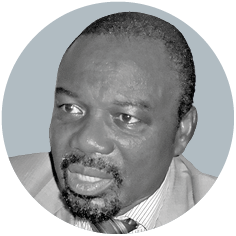Comment
Election won, legitimacy dented
By Samwar Fallah
In the run-off election, Ellen Johnson-Sirleaf got 90.7 % of the votes, while 9.3 % voted for Winston Tubman of the Congress for Democratic Change (CDC), even though he had withdrawn his candidacy and called for boycott of the election. Voter turnout was 38.6 %. In October, incumbent Johnson-Sirleaf had won the first round with 43.9 %, followed by Tubman with 32.7 % and Prince Johnson, a former warlord, with 11.6 %.
Official observers from the Economic Community of West African States
(ECOWAS) stated that they found no major irregularities in the voting process: “The elections of 8 November met the acceptable conditions of being free, fair and transparent.” But the opposition in Liberia does not share this view. Tubman wants the results to be annulled.
After the first round, the opposition complained about irregularities including illegal ballot stuffing, distortions of the electoral roll and others. The CDC accused the National Elections Commission of not staying neutral. The party wanted the Commission replaced, stating it would otherwise boycott the run-off. It also demanded amendments to election laws and constitutional provisions.
These demands were not met, so the CDC leadership decided to call on all CDC supporters and Liberians to stay away from the elections. The ECOWAS mission disapproved of this stance, stating that the CDC’s preconditions violated “the ECOWAS Protocol on Democracy and Good Governance”.
In this mood of confrontation, opposition supporters and security forces clashed on the eve of the run-off election. Allegedly, three opposition supporters were killed. According to the US-based Carter Center, police violence and the closure of media offices by the government “eroded confidence and created an atmosphere of fear in the Liberian capital”.
In the meantime, President Johnson-Sirleaf has set up a committee to investigate the incident. In a nationwide address, she expressed her “deepest condolence” to those affected by the election-related violence. She established a Special Independent Commission of Inquiry and promised: “All those found to have broken the law will be brought to justice.”
Not only present events are diminishing the president’s reputation however. The past is catching up with her. Liberia’s Truth and Reconciliation Commission (TRC), which investigates the root causes of the Liberian civil war, recently put her on a list of people who should be barred from public office for 30 years because of their role in the country’s long civil war. She supported warlord Charles Taylor in 1989, when the civil war began and, at one point, publicly urged him to destroy the Executive Mansion, the official seat of Samuel Doe, who was Liberia’s head of state. Before the TRC, she admitted she gave $ 10,000 for “humanitarian” purposes in areas controlled by Taylor’s men. Many Liberians, however, consider it ridiculous to believe the rebels would use money that way.
Johnson-Sirleaf’s public image also suffered when she sought the support of opposition candidates after the first election round and was endorsed by Prince Johnson. The TRC has indicted him as one of the major perpetrators of heinous crimes. Johnson considered Johnson-Sirleaf the lesser of two evils, fearing he would be prosecuted if Tubman won.
During the election campaign, the Norwegian Nobel Committee announced it would award Johnson-Sirleaf the Nobel Peace Prize. Such news certainly helped her. Accordingly, Liberian opposition politicians blamed the Nobel Committee of meddling in Liberia’s domestic affairs. Tubman said the Committee’s decision was a “provocative intervention” and that his opponent was a “warmonger” not a peacemaker.
Johnson-Sirleaf can certainly still count on the support of the international community. But her impressive victory with more than 90 % is less of a triumph that it might seem. Her high share of votes does reflect the real support the opposition enjoys in Liberia.








